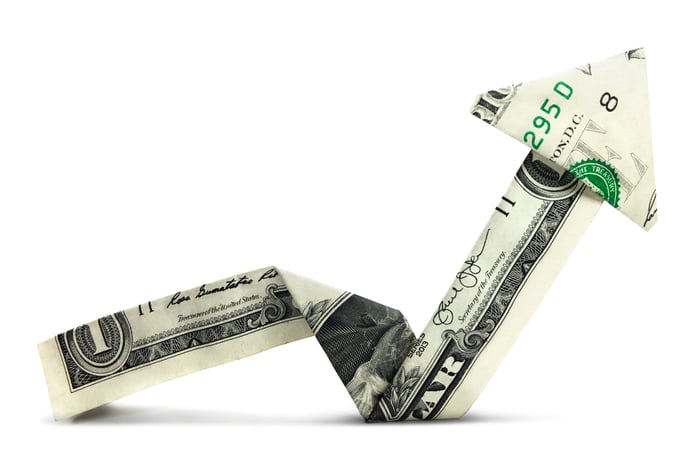Meridian Bioscience (VIVO) ran past its 52-week high last week, closing on Monday at $19.69. The diagnostic testing company, which has thrived during the COVID-19 pandemic, had record revenue in the first quarter. The question is, is it time to get out and take profits yet?
The short answer: probably not. For one thing, the pandemic appears likely to drag on for some time, and while many companies are working on a vaccine, there's no guarantee that one will be produced (or when). Until a successful vaccine comes along, the need for virus testing will grow, especially as workers begin to return to the office. Plus, there are other viruses on the horizon that Meridian's diagnostic tools will be able to help with.

Image source: Getty Images.
Company insiders appear to be bullish on the stock, with three officers buying a total of $198,515 worth in March.
Meridian found a nice niche in testing sales
The big driver for Meridian's profits last quarter was its sales of molecular reagents, which are used by other companies in testing for COVID-19. CEO Jack Kenny, in Meridian's second-quarter earnings report last month, said the company responded quickly to the need for the reagents for RNA virus detection, just as it did when the Zika virus hit in 2015.
On Jan. 27, when the reported COVID-19 cases in the United States were in the single digits and worldwide virus deaths had only reached 56, Meridian announced it was sending its Lyo-Ready 1-Step RT-qPCR Mix to Chinese labs so they could test for the virus. Meridian's product was freeze-dried and stable enough to be sent overseas, then rehydrated in the labs.
Meridian reported $57.3 million in revenue for the quarter, which it said was up 14% compared with the same quarter in 2019. While sales in its diagnostics and life sciences segments grew, the biggest jump was in molecular reagents, which brought in $11.5 million, a 114% rise year over year.
Meridian was already on a rise before the pandemic
The Cincinnati-based company saw a 5.8% revenue dip last year, but it was the third consecutive year in which it improved both its net income and earnings per share.
As healthcare costs have soared, the demand for more diagnostic tests has increased. That's a positive sign for Meridian, whose primary business is making test kits for infectious respiratory diseases, gastrointestinal diseases, and elevated blood lead levels, according to its annual report.
Some of Meridian's other tests include Alethia, which tests for congenital cytomegalovirus (CMV). According to the Centers for Disease Control and Prevention, CMV is the most common cause of infant brain damage and affects one of every 200 infants. The company also had made a name for itself by testing for E. coli bacteria in food.
Meridian's biggest competitors in molecular diagnostics are Cepheid, which is owned by Danaher (DHR 0.71%), and Becton Dickson (BDX -1.30%). Both are much larger companies than Meridian, which has had an edge as it has been able to adapt more quickly to providing its molecular reagents for COVID-19 testing.
There's a lot of room to grow in the space. The molecular diagnostics market worldwide is projected to expand to $6.7 billion by 2029, with a compound annual growth rate (CAGR) of 7.8%, according to ResearchandMarkets.com.
But how much higher can the stock go?
That's the big question. The stock has risen 190% in the past three months. That kind of quick rise may prod some investors to cash in and take profits, and that's understandable.
If you look at the company's other numbers, the rise doesn't seem out of line. The stock's price-to-earnings ratio is 38.4, more reasonable than that of many biotech companies.
Looking at the company's sustained growth over the past few years, it's clearly capable of using the COVID-19 pandemic as a springboard to make a bigger name for itself.

